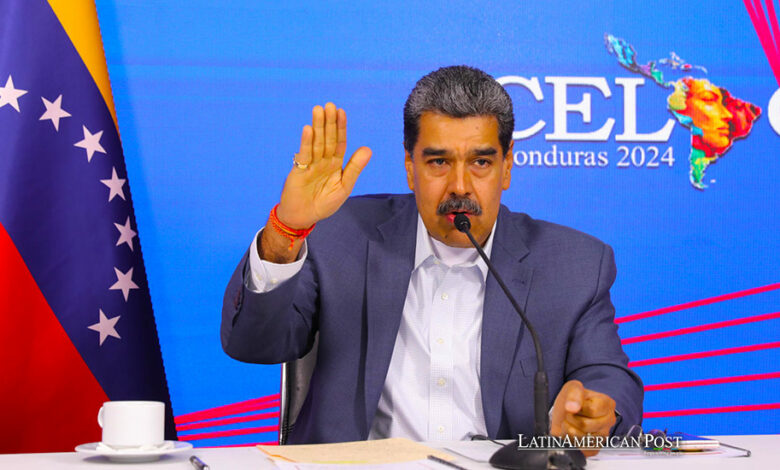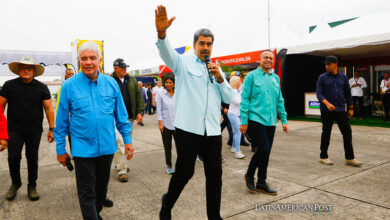Diplomatic Tensions Surge: Venezuela Shuts Embassy in Ecuador

In a bold act of solidarity with Mexico, Venezuelan President Nicolás Maduro ordered the closure of Venezuela’s embassy and consulates in Ecuador following a controversial raid on the Mexican embassy in Quito by Ecuadorian authorities.
The political landscape of Latin America took a dramatic turn this Tuesday as Venezuelan President Nicolás Maduro announced the closure of his country’s diplomatic missions in Ecuador. This drastic step underscores a deepening rift in the region, rooted in an incident that has drawn international attention and condemnation: the Ecuadorian raid on the Mexican embassy in Quito.
Ecuador’s Violation of Diplomatic Premises
The raid, which occurred on April 5, was orchestrated by Ecuadorian President Daniel Noboa to apprehend Jorge Glas, Ecuador’s former Vice President and a convicted felon, who had sought asylum at the Mexican embassy since December. Noboa justified the raid as necessary for national security despite Glas being wanted on corruption charges rather than political offenses. However, this action flagrantly violated the sanctity of diplomatic premises, recognized as inviolable under the Vienna Conventions, leading to a swift and widespread backlash from the global community.
Maduro’s decision came during a virtual meeting of the Community of Latin American and Caribbean States (CELAC), where he and other regional leaders expressed their unwavering support for Mexico’s call for Ecuador’s suspension from the United Nations. Maduro was the only leader to escalate the matter to recalling a diplomatic mission, emphasizing the strong and unanimous disapproval of Ecuador’s actions among the attendees. “The condemnation has been unanimous, total, absolute,” Maduro stated, asserting that no one could defend such a “barbaric act.”
This sentiment was mirrored by Mexico’s President, Andrés Manuel López Obrador, who vehemently argued for Ecuador’s suspension from the UN until it issued a formal apology and vowed to refrain from such violations. López Obrador highlighted the precedent set by Chile’s Augusto Pinochet, who, despite his authoritarian rule, never breached the Mexican embassy during his dictatorship.
Honduras’ Condemnation
Honduras’ President Xiomara Castro, currently presiding over CELAC, opened the meeting by condemning Ecuador’s actions and presented a dramatic video showcasing the raid. The incident has not only strained Ecuador’s relations with Mexico but has also put a spotlight on the broader implications for international diplomacy and the rule of law.
The closure of the Venezuelan embassy in Quito has far-reaching implications, particularly for the large Venezuelan migrant population in Ecuador. With over 475,000 Venezuelans residing in Ecuador, the closure disrupts consular services and creates a sense of uncertainty for those seeking assistance and legal paperwork. This development underscores the human aspect of the political tensions, highlighting the plight of the Venezuelan migrants who are caught in the crossfire of regional politics.
Ecuador’s response to the controversy has been muted on the international stage. President Noboa chose not to attend the CELAC meeting, instead focusing on domestic issues, including law enforcement improvements and an emergency declaration in the electricity sector amid power outages in Quito. His absence was criticized by Maduro, who accused Noboa of hiding from his responsibilities and failing to face his counterparts in Latin America and the Caribbean.
Testing Diplomatic Norms
As the situation unfolds, the international community watches closely. The incident tests the resilience of diplomatic norms and challenges the unity and diplomatic relations within the Latin American region. The decisions made in the coming days will likely influence regional politics for years to come, highlighting the delicate balance between national security and respect for international law.
Also read: Venezuela’s Electoral Saga Escalates as Maduro Seeks Third Term
Venezuela’s bold move to close its embassy not only stands as an act of solidarity with Mexico but also as a statement against the breach of diplomatic protocols. As countries worldwide evaluate their next steps, the principles underpinning international relations hang in the balance, awaiting either reaffirmation or further challenge.





